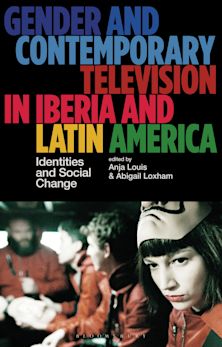Politics of Children in Latin American Cinema
Politics of Children in Latin American Cinema
This product is usually dispatched within 1 week
- Delivery and returns info
-
Free CA delivery on orders $40 or over
Description
Politics of Children in Latin American Cinema explores the trend of portraying children and adolescents in a subjective, adult-constructed point of view in Latin American cinema. This trend, in which the filmmakers are able to express their own anxieties while subordinating the child’s, draws new political implications to these constructions of children’s subjective character. Chapters in this volume touch on intersectional historic contexts, such as the Brazilian judicial system, Mexico’s youth protest, Venezuelan social crisis, the Southern Cone’s post-dictatorships, and race and gender issues in Peru, Ecuador, and Argentina to elucidate these implications and how they affect child agency. Contributors to this book argue for children’s increased agency in film and in society as they analyze films in which children have more active roles. These films mirror the shift toward filmmaking that emphasizes innovative narratives and aesthetic techniques that allow children to be portrayed as social commentators, rather than passive figures. Scholars of Latin American studies, film studies, history, sociology, race studies, and gender studies will find this book particularly useful.
Table of Contents
Chapter 2. Familial Bonds and Developing Subjectivities in Verónica Reidel’s Cápsulas (2011).
Chapter 3. Michel Franco’s Después de Lucía (2012): A Portrait of a Bullied Adolescent.
Chapter 4. A Uruguayan Girl: Anina (2013) by Alejandro Soderguit.
Chapter 5. Melancholia and Relajo in Güeros (2014) by Alonso Ruizpalacios.
Chapter 6. Re-Mediating Adolescent Subjectivities: Indigeneity and the Gendered ‘Dividual’ in El niño pez (2009) and Feriado (2014).
Chapter 7. When Children Direct a Film, What Do They Talk About?
Chapter 8. Under The Wings of the Law: Juizo (2008) by Maria Augusta Ramos.
Chapter 9. On and Off the Road with the Children of Che Guevara: Viva Cuba (2005) and Infancia clandestina (2011).
Chapter 10. Memory Transmission in Paraíso (2009) of Héctor Gálvez.
Chapter 11. What’s Wrong with My Name? Appropriation, Identity and Familial Ties in Cautiva (2005).
Chapter 12. Children Families and National Trauma in Contemporary Dictatorship Films in Chile, Andres Wood’s Machuca (2004) and Pablo Larraín’s No (2012).
Product details
| Published | Oct 14 2019 |
|---|---|
| Format | Hardback |
| Edition | 1st |
| Extent | 274 |
| ISBN | 9781498597418 |
| Imprint | Lexington Books |
| Dimensions | 228 x 160 mm |
| Publisher | Bloomsbury Publishing |

ONLINE RESOURCES
Bloomsbury Collections
This book is available on Bloomsbury Collections where your library has access.



























